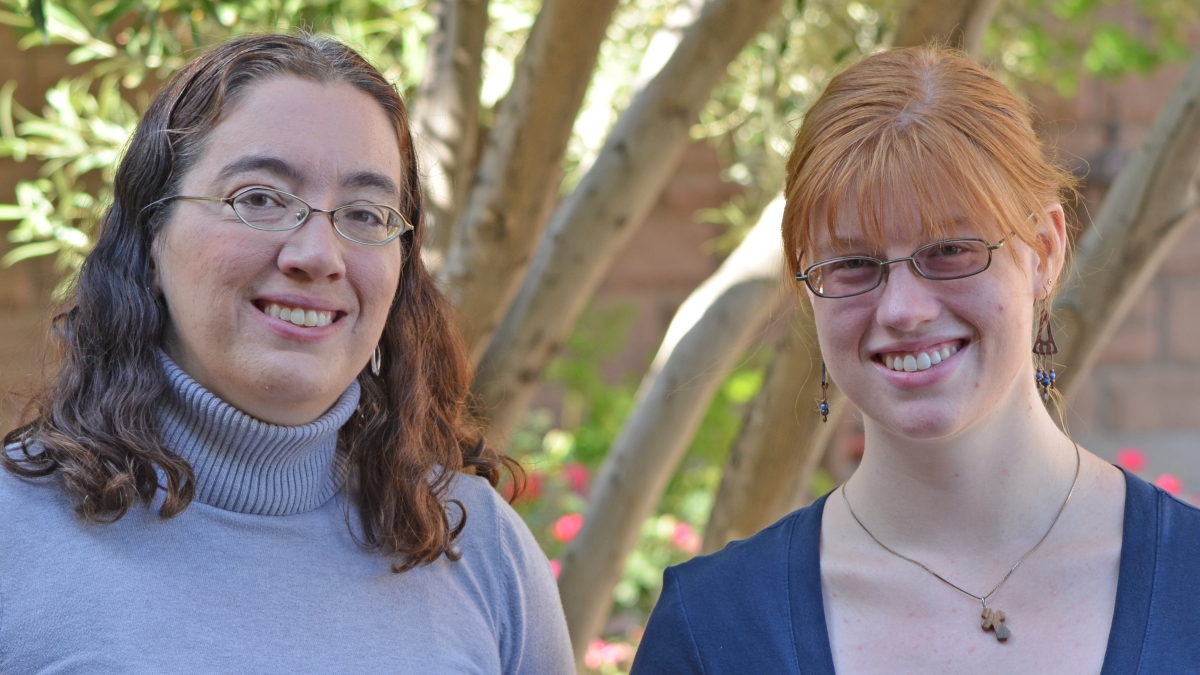100 percent Greek: ASU undergrads take top marks in US Classics competition

Five silver-tongued, first-year Greek language students at Arizona State University are proving that the competitive legacy of the ancient Greeks is alive and well in Tempe, Ariz. And at the vertex is Clara Szymanski, who tested as the top first-year Greek student in the nation, with a perfect score – 100 percent.
Led by Szymanski, the ASU pantheon took some of the top scores on the national College Greek Exam administered by Eta Sigma Phi, a national honors society for Classics undergraduates. Eta Sigma Phi tested the language ability of 486 students from 50 schools, including the five students from lecturer Sarah Bolmarcich’s class in ASU’s School of International Letters and Cultures (SILC) in the College of Liberal Arts and Sciences.
“Our students placed in the top 5.6 percent of exam takers, with an average score of 90 percent – some 36 percent better than the national average,” notes Bolmarcich. “These students are part of one of the best classes that I’ve taught anywhere. Hard work and dedication and a great attitude earned them this national success.”
Eta Sigma Phi recognized all the ASU test takers for their accomplishments. In addition to Szymanski, undergraduates Jon Lang and Olivia (Libby) Alonge received medals for scores exceeding 87.5 percent. The dime-sized silver medals bear Nike, the Greek goddess of victory, on one side, and the Parthenon on the other. Purple ribbons marked “NIKH” or victory, were awarded to undergraduates Jeff Weyant and Alyson Melzer.
Szymanski, who hails from Los Alamos, N.M., graduates in May with a degree in art history. In addition to minoring in German, she was drawn to Greek and Latin because of her interest in archeology. “It is really helpful to read ancient texts in the language which they were written. Reading the original source written by the original author is a completely illuminating experience.”
“There is so much complexity and beauty in the original language,” agrees Alonge. “We are lucky that the class is small, and that the course covered more information than was in the test.”
The students are also quick to point to Bolmarcich’s attentiveness and teaching style, the close-knit community of people that take and teach ancient languages, and the intensive nature of the course, as central to their ability to accomplish so much in such a short time.
“The class combines four semesters of introductory Greek into two. It meets for an hour a day, five days a week. You pretty much have to be on your toes constantly,” says Jeff Weyant, an English major with a concentration in creative writing. He hopes to enter a graduate Classics program in 2013. “Initially I took the course because it always seemed interesting to learn and read Ancient Greek – particularly stuff like Plato. Now I’m a full-fledged initiate into all things Greek and Latin.”
“People aren’t wishy washy about studying ancient languages. They are dedicated, passionate and there because they want to be there. You get to know people really well,” adds Szymanski.
“SILC is a great place for ASU students to come study: not only do you get the benefits of studying a language, but you are also exposed to other cultures and literatures,” says Bolmarcich, who is one of two Hellenists in the Classics faculty group at ASU. In addition to Greek, she teaches Latin, upper-division Greek, Mythology, Ancient World on Film and the Classics online courses – Greek and Latin Roots of Bioscientific Terminology, Greek Civilization, and Roman Civilization. The school offers eight language majors, 10 minors and more than 20 study abroad programs, including a new program that will focus on language and urban planning in Brazil.
Four of the five test takers are members of Eta Sigma Phi. Alonge, a junior and Classics major, is also the vice president of ASU’s Eta Sigma Phi chapter. To join, students must be enrolled in Latin or Ancient Greek language classes, earn a grade of “B” or better, and apply for membership, says Mike Tueller, the school’s associate director for undergraduate studies and Greek instructor. In addition to the social functions of a classics club, Eta Sigma Phi also offers an opportunity for students to earn scholarships and present papers at the American Philological Association, the nationwide professional society to which most Classics faculty members belong.
Students who take Greek or Latin come from a variety of academic programs at ASU, but all are looking to strengthen their skill set for the next steps in their lives. “Most of our students want to go on to graduate school or have strong personal reasons for studying Greek, such as a desire to read the New Testament in the Bible in the original Greek,” says Bolmarcich. “Some of our grads go on to seminaries or law schools. Many of our most recent grads are teaching Latin and Ancient Greek in high schools and middle schools, including the Great Hearts schools here in the Valley.”
“What I hope for most is that our students pass along the understanding that antiquity is important to understanding our own present-day civilization,” says Bolmarcich.